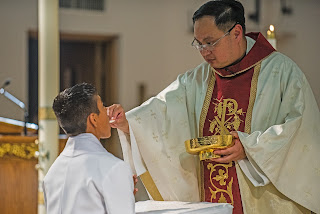 We will serve the Lord
We will serve the Lord
A pivotal moment in my discernment to the priesthood took place during the 30 days Ignatian retreat I had to undergo before my final year of formation. Prior to this, my entire seminary formation had been marked by hesitancy, uncertainty and fear, with this question constantly troubling me: am I really called to be a priest? Although I knew I had the answer given to me on many occasions, though not in the manner of a “St Paul on the Road to Damascus” moment, I still had my doubts especially when I thought of my parents and their future well-being and the enormity of the task and responsibilities set out before me.
Back to the story of my 30 days retreat experience. To state that it was life-changing and foundational to my final decision is an understatement. On one particular dark night near the end of the retreat, not a physical description but a spiritual reference to the condition of my soul, I was assailed once again by a flurry of emotions, deeply troubling doubts and fears. After battling with my inner demons and imagined scenarios of the future, I decided that very night to return home the next morning and proceed straight from the airport to Bukit Nenas to meet the Archbishop and tell him of my decision to leave the seminary, give up the priesthood and return home. I finally went to sleep, exhausted. But in the morning, as I woke up, there was no trace of the heaviness that I had experienced the night before. In fact, my resolve became so much clearer and stronger. I was convinced: whatever the challenges, “I will serve the Lord!”
I believe that many would share a similar faith-story - it is often about having to make a decision to go forward, or backward. This too is the theme of our first reading and the gospel today.
In the first reading, Joshua, the successor of Moses, gathered all the tribes together at Shechem. He had led them in a campaign of conquest, and had divided up the land among the different tribes. These were the same tribes of Israel who had been recalcitrant and complaining a lot during their sojourn in the wilderness as Moses led them forth from Egypt. At this juncture, Joshua did not wish to assume that he had their undivided allegiance. This was the moment to test their mettle, the moment of decision and he wasn’t going to force their hand.
The challenge was: were they going to move into the future with the God who had brought them out of Egypt and into the promised land, or were they going to choose the old gods of their ancestors or maybe the local gods of the land they had conquered? Joshua was not going to presume that he knew their answer and so he laid out this choice before them. If they were willing to follow the Lord, they would need to renew the covenantal promises with the Lord, the covenant which was entered into with their ancestors. Such renewal was necessary because their ancestors had shown themselves to be a rebellious people, breaking covenant with God on many occasions during the Exodus. As he waited for the people’s response, Joshua unhesitatingly declares: “as for me and my house (family), we will serve the Lord.”
This scene at Shechem is put in parallel to today’s gospel reading because Joshua challenged the Israelites to make up their minds whether or not they intended to remain loyal to the Lord, in the same way our Lord Jesus challenges the disciples, at the end of the Bread of Life discourse, to see if they would accept His teachings and continue to follow Him. Once again, we are witnessing a tense moment of decision. Many decided to walk away but St Peter and others remained, declaring: “Lord, who shall we go to? You have the message of eternal life, and we believe; we know that you are the Holy One of God.”
The similarity between the two stories does not only highlight a challenge to loyalty, but specifically to covenant loyalty, since the Eucharist is the new and everlasting covenant which our Lord sealed at the Last Supper and by His death on the cross. As the people of Israel were given the choice to accept or reject the old covenant, our Lord is providing His disciples with the choice of accepting His Eucharistic teaching or rejecting it, if they find it intolerable.
This is what our Lord had said in the discourse on the Bread of Life and which is what the Church teaches about the Eucharist, and this is what we must accept as truth before we can worthily participate in the Most Holy Sacrifice of the Mass and receive Holy Communion:
Jesus is the Bread of Life that has come down from heaven;
No one who comes to Him will ever hunger; no one who believes in Him will ever thirst.
The bread that He shall give is His flesh, for the life of the world.
If you do not eat the flesh of the Son of man and drink His blood, you have no life in you.
Anyone who does eat His flesh and drink His blood has eternal life, and He shall raise that person up on the last day.
For His flesh is real food and His blood is real drink.
Whoever eats His flesh and drinks His blood lives in Him and He lives in that person.
This is why we answer “Amen” at Holy Communion, just before we receive it. “Amen” is often translated as “so be it,” an assent to the statement which precedes it. So, when we say “Amen” in response to the words uttered by the priest or extraordinary minister of holy communion, “the Body of Christ,” we are practically saying that we agree - we believe this to be true – the host that we are about to consume is truly, really, and substantially the Body and Blood of Christ, soul and divinity.
But the assent is not just an assent of faith but a commitment to action. Tertullian, a 3rd century North African theologian, applied the Latin term sacramentum to the rites of baptism and Eucharist. Sacramentum referred to the oath of allegiance that soldiers made to the Roman emperor to serve him, even with their life. At this time in the Church’s history, persecutions were common enough to make baptism into Christ a commitment that could mean dying for the faith. Thus, saying “Amen” to the sacrament of the Body and Blood of Christ serves as a Catholic pledge of allegiance to follow Christ. It is literally saying, “Yes, I will serve the Lord! Yes, I will die for this truth!”
So, saying “Amen,” means you assent to your faith, with your head and heart and will. Not only are you saying that you believe in the real presence but that you are also committing yourselves to living and acting as Jesus did, and you continue to do. Make no mistake, do not receive holy communion lightly and take it as a harmless ritual. Whenever, you stand at the threshold of receiving holy communion, you are asked to renew your commitment to believe in the Lord and His teachings, to love Him and serve Him with your entire being because He is “the Holy One of God” who offers us “the message of eternal life” and “the Bread of Life that has come down from heaven.”

